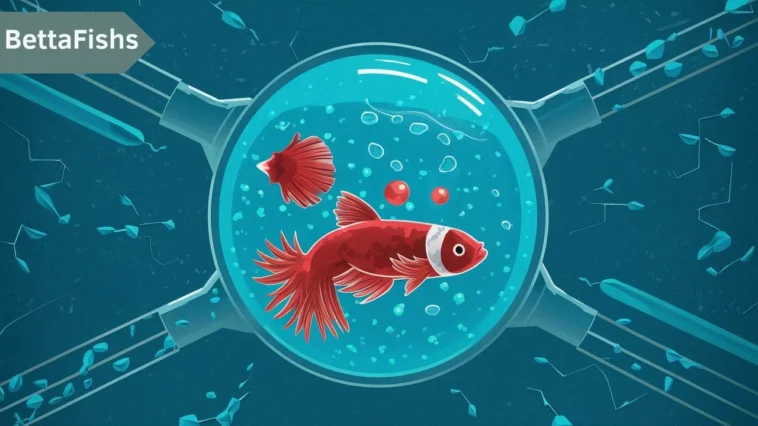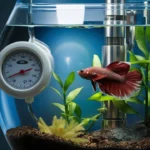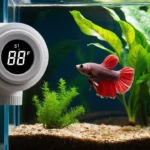Betta fish, also known as Siamese fighting fish, are a popular choice for aquarium enthusiasts due to their vibrant colors and captivating personalities. However, when it comes to their care, one of the most frequently asked questions is, “ How long can a Betta fish live in tap water? ” The answer to this question is crucial, as water quality plays a significant role in the health and longevity of these beautiful creatures.
Betta Fish
Betta fish originate from the shallow waters of Thailand, Cambodia, and Vietnam, where they thrive in warm, slightly acidic environments. In their natural habitat, they live in slow-moving streams, ponds, and rice paddies, which are quite different from the tap water we typically have in our homes. Under optimal conditions, a Betta fish can live for 3 to 5 years, and sometimes even longer with exceptional care.
Composition of Tap Water
Tap water, while safe for human consumption, often contains chemicals and contaminants that can be harmful to Betta fish. Common substances found in tap water include:
- Chlorine and Chloramine: These chemicals are added to municipal water supplies to kill bacteria and other pathogens. However, they are toxic to fish, and even small amounts can cause significant harm.
- Heavy Metals: Metals like copper, lead, and zinc can be present in tap water due to aging pipes. These metals are harmful to fish and can lead to poisoning over time.
- Other Contaminants: Fluoride, nitrates, and phosphates can also be present in tap water, contributing to an environment that is less than ideal for Betta fish.
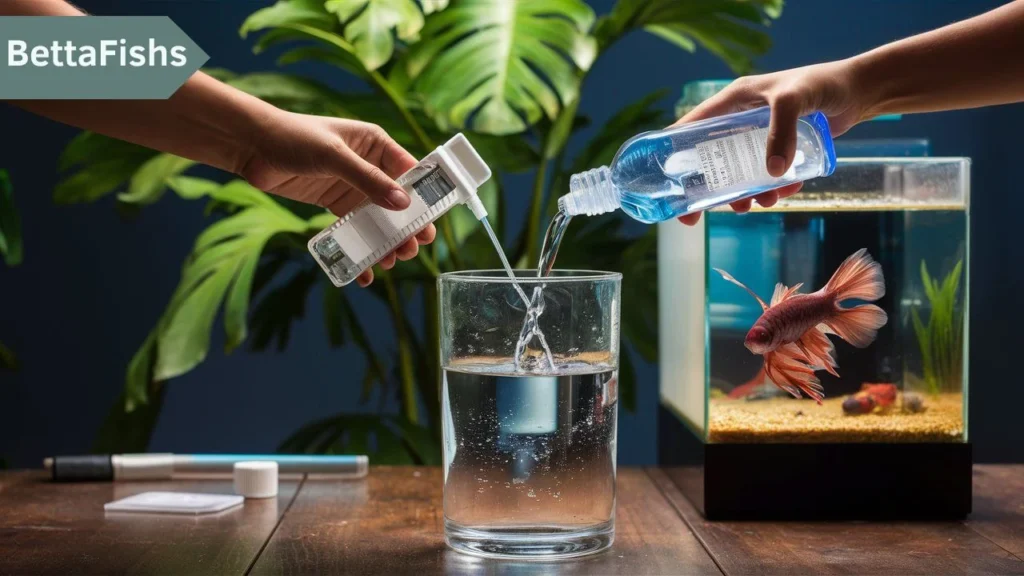
Effects of Tap Water on Betta Fish
The impact of untreated tap water on Betta fish can be immediate and severe. Exposure to chlorine, chloramine, and heavy metals can cause gill damage, making it difficult for the fish to breathe. Over time, the stress caused by poor water quality can weaken the immune system, making Betta fish more susceptible to diseases such as fin rot and ich.
Signs that your Betta fish may be suffering due to poor water quality include:
- Lethargy: If your Betta is less active than usual, it could be a sign of stress from poor water quality.
- Clamped Fins: This is a common indicator that something is wrong in the tank environment.
- Loss of Appetite: If your Betta is refusing to eat, it may be stressed or unwell due to harmful water conditions.
The Role of Water Conditioners
Water conditioners are essential tools for anyone keeping Betta fish in tap water. These products are designed to neutralize harmful substances in tap water, making it safe for aquatic life. When you add a water conditioner to your tap water, it binds to the chlorine, chloramine, and heavy metals, rendering them harmless to your fish.
Some of the most recommended water conditioners for Betta fish include:
- Seachem Prime: Known for its effectiveness in neutralizing chlorine and chloramine.
- API Stress Coat: Not only does it detoxify harmful substances, but it also adds a protective slime coat to the fish.
Alternatives to Tap Water
While tap water can be made safe with the use of conditioners, some fish keepers prefer to use alternatives. These include:
- Bottled Water: While seemingly safer, bottled water is often not recommended because it may lack essential minerals or could have been treated with chemicals that are harmful to fish.
- Distilled Water: This type of water has had all of its minerals removed, which can be harmful to Betta fish as they require certain minerals to maintain their health.
- RO (Reverse Osmosis) Water: This water has been filtered to remove nearly all contaminants and can be an excellent option when re-mineralized properly.
How to Prepare to Tap Water for Betta Fish
If you choose to use tap water for your Betta fish, proper preparation is key. Here’s how you can do it:
- Fill a Clean Container: Use a clean, chlorine-free container to collect tap water.
- Add a Water Conditioner: Add the appropriate amount of water conditioner to neutralize harmful chemicals.
- Let the Water Sit: Allow the treated water to sit for at least 24 hours before introducing it to your Betta fish tank. This gives the conditioner time to work effectively.
- Test the Water: Use a water testing kit to ensure the water is at the correct pH level and free of contaminants.
Can Betta Fish Survive Without Water Treatment?
It’s a common misconception that Betta fish are hardy enough to survive in any condition, including untreated tap water. While it’s true that Betta fish are more resilient than some other species, exposing them to untreated tap water is risky. At best, a Betta fish might survive a few days in untreated tap water, but it will undoubtedly suffer from stress and potential health issues.
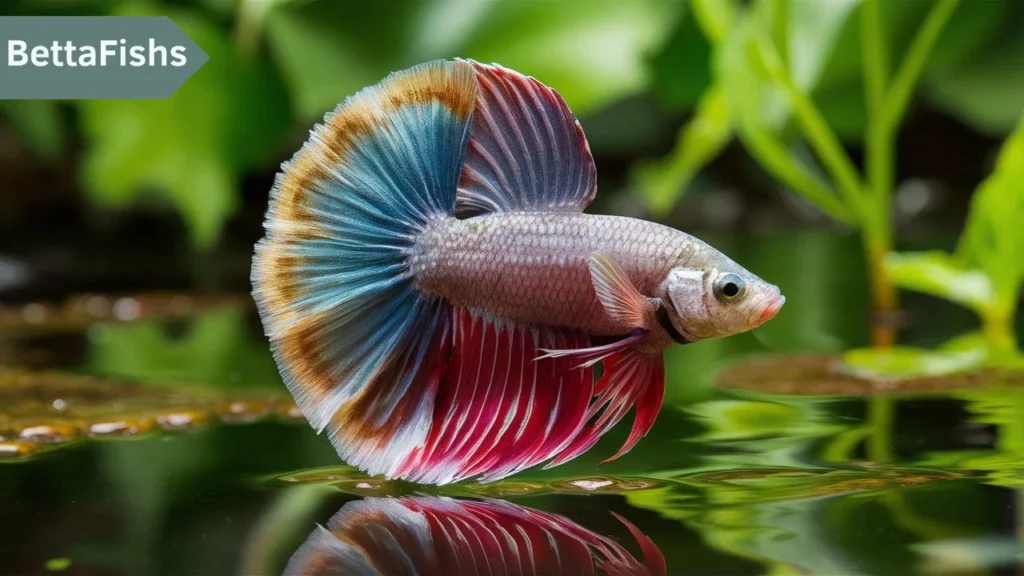
Monitoring Your Betta Fish’s Health
To ensure your Betta fish stays healthy, regular monitoring is essential. Look for the following signs to gauge their well-being:
- Active Swimming: Healthy Betta fish are active and swim with ease.
- Bright Colors: Vibrant colors indicate good health.
- Healthy Appetite: A Betta fish that eagerly eats is usually in good health.
If you notice any changes in behavior or appearance, it might be time to check the water quality and make necessary adjustments.
Common Myths About Betta Fish and Tap Water
One of the most pervasive myths about Betta fish is that they can survive in any condition, including untreated tap water. This misconception often leads to improper care and, ultimately, the early death of the fish. Another common myth is that small containers or bowls are sufficient for Betta fish. In reality, Betta fish thrive in larger, well-maintained tanks with proper water conditions.
Conclusion
Ensuring the health and longevity of your Betta fish starts with understanding the importance of water quality. While tap water may be convenient, it’s essential to treat it properly to remove harmful chemicals and contaminants. By using water conditioners, monitoring your fish’s health, and debunking common myths, you can provide a safe and comfortable environment for your Betta fish, helping them live a long, happy life.
FAQs
How often should I change the water in my Betta fish tank?
It’s recommended to change about 25-50% of the water in your Betta fish tank weekly to maintain optimal water quality.
Can I use tap water for water changes?
Yes, you can use tap water for water changes, but it must be treated with a water conditioner before adding it to the tank
What temperature should Betta fish water be?
The ideal water temperature for Betta fish is between 76°F and 82°F (24°C to 28°C).
How do I know if my Betta fish is stressed?
Signs of stress in Betta fish include clamped fins, loss of appetite, lethargy, and faded colors.
What’s the best water conditioner for Betta fish?
Seachem Prime and API Stress Coat are among the top-recommended water conditioners for Betta fish due to their effectiveness and added benefits.


